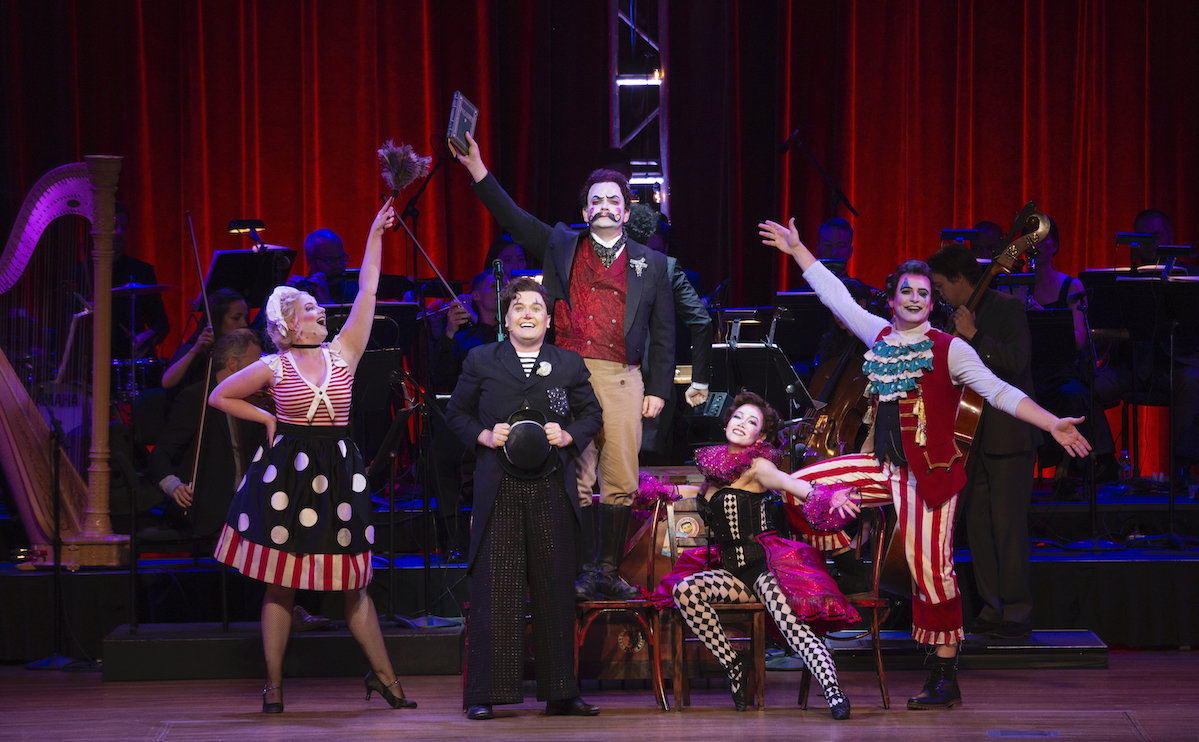HIGHLAND PARK, IL—My last trip to the Ravinia Festival was on opening week in early June. It was unseasonably cold and blustery; wind whipped picnic blankets and napkins about. I regretted not bringing a parka.
Summer weather was slow to start, and the outdoor oasis’ box office inevitably took a hit during a season that started with a cold and rainy June and progressed to a blisteringly hot July. But as Ravinia’s 2019 season steers toward its end, this week could not have been more perfect for an evening of music under the stars; Wednesday presented picture-perfect weather and just enough of a chill in the air that there was only one logical thing to do: head to Ravinia.
On tap that night was the Midwest premiere of Leonard Bernstein’s Candide, as played by The Knights. It was the New York-based orchestra’s eighth appearance at Ravinia, an engagement that kicked off Monday with violinist Gil Shaham, who, like The Knights, is a festival favorite.
Brothers and Knights co-artistic directors Eric and Colin Jacobsen are rewriting the rules of chamber music, energizing and modernizing the form through genre-bending adaptations and imaginative, immersive collaborations. That works in director Alison Moritz’s favor, who makes her Ravinia debut with this decadent and delicious Candide.
Despite my familiarity with Candide’s overture, a piece I played as a kid and have heard hundreds of times since, I had yet to see the full production of Bernstein’s charming, self-deprecating operetta live. As it turns out, neither had Ravinia. Despite the Festival’s deep commitment to Bernstein—due in large part to President and CEO Welz Kauffman’s admiration for and expertise with the composer’s catalog—a full-length production of Candide had not graced this gorgeous venue’s stage until now.
The Knights’ musicians aren’t just accompanists, here, they’re part of the action, placed on stage and hugged by a semi-circular rig of theatrical curtains behind them lit in a variety of colors, returning often to a velvety red. Aaron Copp’s lavish designs adorn the stage with strings of olde-timey Edison bulbs which join at a pinnacle above Jacobsen, whose podium is exchanged for that of circus ring master. The setting is a wink at life under the big top—a nod to the pandemonium about to ensue—which combines cohesively and quite magically with Amanda Seymour and Tommy Kurzman’s Comedia dell’Arte vibe in the production’s whimsical costumes, wigs and make-up.

First performed in 1956 to music by Bernstein, book by Lillian Hellman and lyrics by Richard Wilbur, the two-act comedy is based on Voltaire’s 1759 satirical novel of the same name. Here, we get Bernstein’s “final revised version,” recorded with a new book by Hugh Wheeler in 1989 shortly before Bernstein’s death.
The operetta’s protagonist and unassuming hero, Candide, was an illegitimate child whose natural inclination is to look on the bright side of life. Played by the extraordinary Miles Mykkanen, Candide roams the world in pursuit of his one true love, Cunegonde (soprano Sharleen Joynt).
It’s a strong cast all around, particularly evident in the serious, and not-so-serious chorales interspersed throughout this fantastical tale. St. Charles native Evan Bravos was in as Maximillian (for Alexander Elliott), Cunegonde’s bother, who, despite dying several times, somehow finds his way through Europe and across the Atlantic to encounter Candide. He’s jovial and collegial every time, until he once again realizes a “bastard child” is in love with and wants to marry his sister. Margaret Gawrysiak, Evan Jones and Sarah Larsen as the story’s sidekicks—the old lady, Pangloss/Voltaire/Cacambo, and Paquette— are equally laugh-out-loud funny and yet somehow bring emotional depth to these ridiculous characters. Alex Mansoori as the Baron wittily guides us through this convoluted tale, his monologues transparently admitting all the fallacies of this plot. (Good on Hugh Wheeler, who has this opera criticizing itself in real time so we don’t have to.)
Dancers John Eirich and Courtney Lopes frequently flank the stage, dancing balletic interpretations of the music in harlequin-like costumes and jazz oxfords. It wasn’t until they came out as a pair of ambivalent golden sheep that I realized they’re also hilarious, so the uneven disconnect between John Heginbotham’s choreography and the rest of the action on stage felt like a missed opportunity. A cappella chorales were joined in, even, by The Knights’ tuba player, but the dancers were left standing there. Why not have them at least fake it and lip sync along? And though this Candide intentionally didn’t grab onto a specific time period, the actors’ accents vacillated between Shakespeare-lite and Chicago suburbs from scene to scene, and even paragraph to paragraph.
But of their singing, I have no complaints. Joynt is unparalleled as Cunegonde in the production’s only aria, Glitter and Be Gay. She is equally matched with Mykkanen, whose heart-wrenching solo, Nothing More Than This, comes just as Candide takes off his rose colored glasses to see the world for what it is: neither good nor bad.
—
Header photo of Candide at Ravinia Festival Aug. 28 by Patrick Gipson/Ravinia Festival
